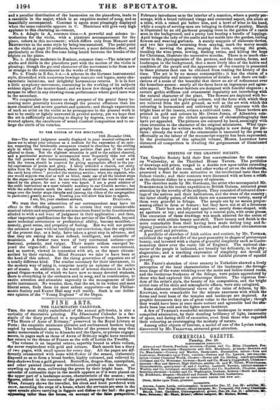TO TEl EDITOR OP THE SPECTATOR.
10th December 1844.
Srn-The sound judgment usually displayed in your musical critiques in- duces me to adopt your columns as a medium for the expression of an opin- ion respecting the intolerable annoyance created in churches by the stirring et le in which very many of the organists perform that part of the service allotted to them. Not the slightest attention is paid to the subject chanted, and a penitential sentence is accompanied more frequently than not with the full powers of the instrument; which, I am of opinion, if used at all with the voices, should be reserved for giving appropriate effect to the joy- ful expressions of praise and glory. I lately attended a church, not many miles from St. George's Southwark, where the sentence commencing Let all the earth keep silence" preceded the morning service; when the organist, who one would suppose was deaf as well as blind, made use of all the loudest stops in the organ-a powerful one. In one respect the spirit of the words was main- tained by the player, for not a voice was heard. I am a great admirer of the noble instrument as a most valuable auxiliary in our Church service ; but while the softer strains sooth the mind and assist devotion, an unrestrained range over the louder stops disturbs and (among the elders of the congregation in particular) greatly annoys. Trusting you will allow this hint to appear,
I am, Sir, your obedient servant, DULCIANA.
We trust that the admonition of our correspondent may have its effect in the offending quarter. It is certain that very considerable musical talents and acquirements are sometimes found in the functionaries alluded to with a sad want of judgment in their application : and then, other important qualifications for the due service of the Church, beyond mere technical correctness or professional ability, become manifest,- namely, good sense, and propriety of feeling. But we will not permit the occasion to pass without testifying our conviction, that the organists of the present day, as a body, have taken a great step in advance, and that they are among the most refined, intelligent, and scientific of musicians. A former race were of very contracted notions-pro- fessional, pedantic, and vulgar. Their music seldom emerged be- yond the organ-loft ; their ideas of excellence were conventional, and as narrow, viewed in connexion with art, as the space circum- scribed by their curtains. Blind STANLEY we take to have been at the head of this school. But the rising generation of organists are of a totally different kind. The studies necessary for their instrument, in the modern way of using it, comprise nearly an epitome of the entire art of music. In addition to the world of science disclosed in Baca's grand Organ-works, of which we have now so many devoted students, there is everything in the orchestra and in song, and in combination, to excite attention and stimulate ingenuity in the management of their noble instrument. No wonder, then, that the art, in its widest and most liberal sense, finds them its most ardent supporters-as the Philhar- monic Society and Exeter Hall may well testify. Such is our delibe- rate opinion of the " Young England " of the Organ.


























 Previous page
Previous page